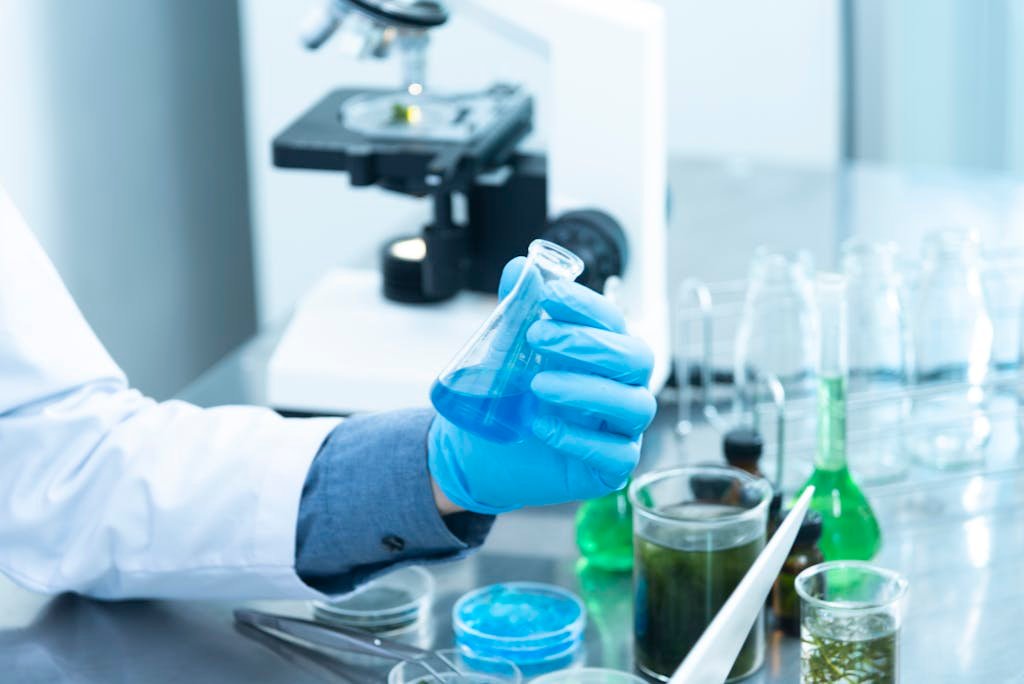Chemistry Class 10 Chapter 1 MCQ Online Test
Our Chemistry Class 10 Chapter 1 MCQ Chemical Reactions and Equations MCQs are crafted by subject matter experts with thorough research, offering students a creative way to enhance their problem-solving skills. By solving these Chemistry Class 10 Chapter 1 MCQ, students can improve their memorization and concentration skills while deepening their understanding of the chapter.
Completing the chapter is crucial for performing well in the Class 10 Chemical Reactions and Equations MCQ. Regular practice of multiple-choice questions helps students build a solid foundation and familiarize themselves with the exam structure.

Practicing Chemical Reactions and Equations MCQs is beneficial as it promotes crisp accuracy, among other advantages.
Chemistry Class 10 Chapter 1 MCQ: Chemical Reactions and Equations Class 10 MCQ
1. The chemical formula of magnesium oxide is __.
a) Mg
b) MgO
c) Mg2O
d) MO
Correct Answer: b) MgO
Explanation: Magnesium oxide is formed when magnesium reacts with oxygen, and its chemical formula is MgO.
2. Which of the following are exothermic processes?
a) Freezing of water
b) Melting of ice
c) Evaporation of water
d) Boiling of water
Correct Answer: a) Freezing of water
Explanation: Exothermic processes release energy in the form of heat. Freezing of water releases heat to the surroundings.
3. The reaction between an acid and a base to form salt and water is called:
a) Combustion reaction
b) Neutralization reaction
c) Oxidation reaction
d) Decomposition reaction
Correct Answer: b) Neutralization reaction
Explanation: Neutralization reactions involve the combination of an acid and a base to form salt and water.
4. Which of the following shows an oxidation reaction?
a) CuO + H2 → Cu + H2O
b) 2Na + Cl2 → 2NaCl
c) 2Mg + O2 → 2MgO
d) CaCO3 → CaO + CO2
Correct Answer: c) 2Mg + O2 → 2MgO
Explanation: In this reaction, magnesium (Mg) gains oxygen (O2) to form magnesium oxide (MgO), indicating oxidation.
5. Oxidation is a process which involves
a) Gain of electrons
b) Loss of electrons
c) Neither gain nor loss of electrons
d) Both gain and loss of electrons
Correct Answer: b) Loss of electrons
Explanation: Oxidation involves the loss of electrons.
6. Which reaction is an example of a combination reaction and a decomposition reaction?
a) 2H2O2 → 2H2O + O2
b) 2Na + Cl2 → 2NaCl
c) 2H2 + O2 → 2H2O
d) CH4 + 2O2 → CO2 + 2H2O
Correct Answer: a) 2H2O2 → 2H2O + O2
Explanation: This reaction involves the decomposition of hydrogen peroxide into water and oxygen, as well as the combination of elements to form compounds.
7. The process of reduction involves
a) Gain of electrons
b) Loss of electrons
c) Neither gain nor loss of electrons
d) Both gain and loss of electrons
Correct Answer: a) Gain of electrons
Explanation: Reduction involves the gain of electrons.
8. Which of the following is an endothermic process?
a) Condensation of water vapor
b) Freezing of water
c) Sublimation of dry ice
d) Evaporation of water
Correct Answer: c) Sublimation of dry ice
Explanation: Endothermic processes absorb heat from the surroundings.
9. Sodium and chlorine are reacted, and as a result, sodium chloride is formed, which is also called table salt. What option gives the reactants and products of the reaction?
a) Na + Cl2 → NaCl
b) NaCl + Cl2 → Na + Cl
c) Na + NaCl2 → NaCl
d) NaCl + Na → Cl2
Correct Answer: a) Na + Cl2 → NaCl
Explanation: Sodium (Na) reacts with chlorine (Cl2) to form sodium chloride (NaCl).
10. Which of the following reaction can also be termed a thermal decomposition reaction?
a) 2H2O2 → 2H2O + O2
b) CaCO3 → CaO + CO2
c) 2Na + Cl2 → 2NaCl
d) 2Mg + O2 → 2MgO
Correct Answer: b) CaCO3 → CaO + CO2
Explanation: Thermal decomposition reactions involve the breakdown of a compound into simpler substances due to the application of heat.
11. What type of chemical reactions take place when electricity is passed through water?
a) Oxidation reaction
b) Reduction reaction
c) Combination reaction
d) Displacement reaction
Correct Answer: c) Combination reaction
Explanation: When electricity is passed through water, it undergoes a combination reaction to form hydrogen and oxygen gases.
12. A student performs an experiment to form aluminium chloride from aluminium and chlorine. Which of the following option gives the chemical equation of the reaction?
a) 2Al + 3Cl2 → 2AlCl3
b) Al + Cl2 → AlCl3
c) AlCl3 + Cl → Al + 3Cl2
d) Al + 3Cl → AlCl3
Correct Answer: a) 2Al + 3Cl2 → 2AlCl3
Explanation: Aluminum reacts with chlorine to form aluminum chloride.
13. A substance added to food containing fats and oils is called:
a) Preservative
b) Emulsifier
c) Antioxidant
d) Flavor enhancer
Correct Answer: b) Emulsifier
Explanation: Emulsifiers are substances added to food containing fats and oils to stabilize and prevent separation.
14. What happens when lead nitrate reacts with potassium iodide?
a) Precipitation reaction
b) Neutralization reaction
c) Combustion reaction
d) Redox reaction
Correct Answer: a) Precipitation reaction
Explanation: Lead nitrate reacts with potassium iodide to form lead iodide, which is insoluble and precipitates out of solution.
15. The condition produced by aerial oxidation of fats and oils in foods marked by unpleasant smell and taste is called:
a) Fermentation
b) Oxidation
c) Rancidity
d) Decomposition
Correct Answer: c) Rancidity
Explanation: Rancidity is the condition produced by the aerial oxidation of fats and oils in foods, resulting in an unpleasant smell and taste.
16. Which of the following is a balanced chemical equation for the reaction between magnesium and oxygen?
a) Mg + O2 → MgO
b) Mg + 2O2 → 2MgO
c) 2Mg + O2 → Mg2O2
d) 2Mg + 2O → 2MgO
Correct Answer: a) Mg + O2 → MgO
Explanation: The balanced chemical equation for the reaction between magnesium and oxygen is Mg + O2 → MgO.
